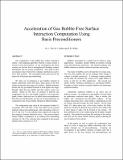| dc.contributor.author | Tan, Kiok Lim | |
| dc.contributor.author | Khoo, Boo Cheong | |
| dc.contributor.author | White, Jacob K. | |
| dc.date.accessioned | 2003-12-23T01:55:44Z | |
| dc.date.available | 2003-12-23T01:55:44Z | |
| dc.date.issued | 2002-01 | |
| dc.identifier.uri | http://hdl.handle.net/1721.1/3993 | |
| dc.description.abstract | The computation of gas bubble-free surface interaction entails a time-stepping algorithm whereby a linear system is solved at each time-iteration. In our investigation, the linear systems are derived from a desingularized boundary integral formulation and are poorly conditioned. This leads to poor convergence rates when Krylov subspace methods are used to solve these systems. The convergence rates may however be improved with proper preconditioning.
We limit our investigation to gas bubbles initiated at depths sufficiently small such that a spike forms on the free surface during the later stages of evolution. Bubble dynamics dictate that for gas bubbles initiated at such depths, the stages through which the gas bubble and free surface evolve are similar. Based on this fact, we propose to perform one computation run for a gas bubble initiated at one particular depth, obtain a judicious set of a priori basis preconditioners from this run and thereafter, use this set of preconditioners on computation runs for gas bubble initiated at different depths.
The computation time taken by the proposed method is, in general, 50% and 20% of the time taken by the present method (without preconditioning) with terminating criteria of 1.0e-5 and 1.0e-7 in the infinity-norm respectively using the Bi-conjugate Gradient Stabilized solver. The present method further enables computation to an infinity-norm terminating criterion of 1.0e-10 in a shorter time compared to the present method with a criterion of 1.0e-5. | en |
| dc.description.sponsorship | Singapore-MIT Alliance (SMA) | en |
| dc.format.extent | 130737 bytes | |
| dc.format.mimetype | application/pdf | |
| dc.language.iso | en_US | |
| dc.relation.ispartofseries | High Performance Computation for Engineered Systems (HPCES); | |
| dc.subject | gas bubble-free surface interaction | en |
| dc.subject | desingularized boundary integral | en |
| dc.subject | Krylov subspace methods | en |
| dc.subject | bubble dynamics | en |
| dc.title | Acceleration of Gas Bubble-Free Surface Interaction Computation Using Basis Preconditioners | en |
| dc.type | Article | en |

